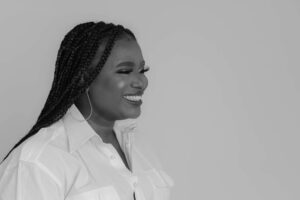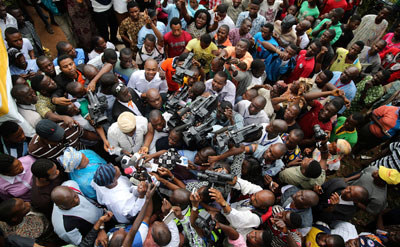In response to our request for thoughts on Journalism in Nigeria in 2023, Operations Effectiveness Manager, Big Cabal Media, Anita Eboigbe offers some major points to ponder on how the Nigerian media industry can reach its full potential.

What does communication mean to you? And for media folks, what does media mean to you? When was the first time you really thought about this question? The first time I truly grasped the importance of communication and its larger significance in mass media scale was in my Theories of Mass Communication class as an undergrad. I’d admit it was renowned British Professor, Denis McQuail who really won me over with his detailed resources on how to navigate the depth of communication and why it mattered to society.
His definition of communication was the first thing that caught my eye, and it has continued to be top of mind all these years. McQuail said that communication is a process that increases commonality but also requires elements of commonality for it to occur at all. I love how this definition underscores the process and importance of communication in one simple sentence — whether it is compact communication between individuals or mass communication between several groups of people.
I am obsessed with the sustainability and growth of Nigerian media. My recent visit to rural southern Nigeria where I grew up reaffirmed my insistence on the power of media especially as I observed the wide commonalities gap between Nigerians across demographics, particularly rural and urban.
As you journey down from the highrises in Lagos or Abuja, the houses begin to look shorter and then abruptly smaller and less inhabitable. The resources also go from a sharp manageable infrastructure to no infrastructure at all. It is crazy how you could be on a tarred road and the next second, your vehicle is galloping on caked red soil or a muddy tyre trap depending on the season.
The first thing that comes to my mind is that we have to intentionally build upon existing shared commonalities like culture or religion with new ones like a strong accountability culture for our leaders and bias to development action from the smallest to the largest spaces. It is only the media that has the power to do this kind of work and wield this kind of influence.
The Nigerian media industry has grown in a lot of ways especially in the boldness of the new-wave media focused on investigations. This is good but the outcomes of these investigations are far removed from the other divide that does not live in major cities. There are too few media machineries to not only dissect and distil the messages but provide continued orientation and information reinforcement on the things they can demand and perform as citizens.
What this simply means is that the media is too far from the people at the bottom of the socioeconomic pyramid in Nigeria. They cannot get the right information they need to have about Nigerian society, especially on issues around what the government owes them, how they can do their part and what opportunities exist in the world that they can tap into.
This creates a big gap between Nigeria and true development because people can only push for what they know and understand. It is even more dangerous because while in big cities we ask the president to do better, governors get away with the barest minimum because most Nigerian states are made up of rural communities where media resources are sparse, nonexistent or too poor to hold the government accountable.
The primary purpose of the media is to inform, educate and entertain. Its job is to report, teach, set the right agenda and keep the people entertained as they navigate life. If you look closely, the Nigerian media often reports too much of the same thing which makes sense considering that it is constantly in survival mode but which also does not bode well for its sustainability goals. Information diversity in media is important so people can see what is possible and what they can aspire to.
People, especially young people, will mostly become what they see. As I interacted with some of these young people, they noted that the news was too national and they didn’t really see how it affected them except to remind them that the president and his cabinet have failed.
They were right. There is no media for them, shifting focus from national to regional issues and breaking these down in ways that inform, educate and entertain.
One reason Nigerian media does not have a strong sub-national effect is distribution. For our population, the industry has not really cracked solid distribution models that are effective and sustainable. The second part is sub-national reporting. We have localised parachute journalism, sending journalists with urban agendas and training to rural areas to cover stories for a day, a week or a month, then return to the capitals to write the stories with a national gaze.
It works right now given the economy of the industry but it does not work for the long-term development we hope to achieve. We need more sub-national and regional media organisations working closely with Civil Society Organisations (CSOs) and other socio-economic stakeholders. Community newspapers and radios, with apparatus focused on informing, educating and entertaining the sub-national regions, should be more commonplace.
These things — better distribution, reporting diversity and regional media setups — cost money and resources. Now we are back to what keeps me up at night. Media sits at the centre of development and nothing really gets better without its full cooperation. All forms of media, from creative to news, require a lot of resources which we will continue to be short of until we begin to think more strategically and execute more ruthlessly but broadly.
For the Nigerian media industry to reach its full potential, there need to be honest conversations across the board and intentional implementation of models, framed by us and with the larger growth and development of the country in mind.
The industry also needs to begin to operate like an industry. It is important to note that the current structure mirrors a larger Nigerian creative industry problem where people open small kiosks with no clear vision of how it feeds into bigger goals and struggle to keep them open.
Personally, I think the most important issue is the slow pace of acceptance of diverse media roles. In the industry, people are either reporters and investigative journalists or they are not “serious journalists”. Within the newsroom, we see editors struggling to remain reporters because there is so much prestige in fieldwork. Who would edit stories then? Where are the hundreds of training sessions for editors as we continue to train investigative journalists? Where are the training sessions for other journalists who cover diverse issues? How are we comfortable with poor editing in publications because we have made reporting the sole goal of media work?
How do we train new media founders or people who work in media strategy so they can keep the lights on? We can’t deny that there is a snobbery of other players in the industry that actually keep the boat running. I remember someone saying they did not really understand what a colleague did as they don’t “go to the field”. Meanwhile, that person handled business, chasing the funds the “serious journalist” needed to do serious work.
Stakeholders in the Nigerian media industry must make peace with the fact that the principles and ethics of journalism are for practising journalists across various sectors from economic reporting to music reporting, and all forms of media contribute to the overall state of a nation. Music and films are as important as politics and religion. The goal is to have a stable and working society with thriving socio-economic factors.
To move forward, let’s have better conversations and task our colleagues to apply high ethical considerations and journalism standards as well as ensure that the reporting continues to matter. This is on the one hand.
On the other hand, let’s embrace diverse media roles, hire strategists and executors across the various needs of a media organisation with clearer purpose from product to reporting, engagement, growth, programmes and business development.
When people ask me what I want for the Nigerian media industry in 2023, my answer is simple — I want us to continue to learn intentionally, embrace various players across the sector, teach each other, set better goals, report more subnational Nigerian issues by supporting smaller players who attempt to do the work and begin to really think about the prosperity of the industry in whatever form that matter to individual newsrooms and organisations.
Above all, let’s remember that we are building an industry that supports other industries/sectors and holds them accountable. If we are the fourth estate of the realm, let it be a robust, impactful and thriving one.

